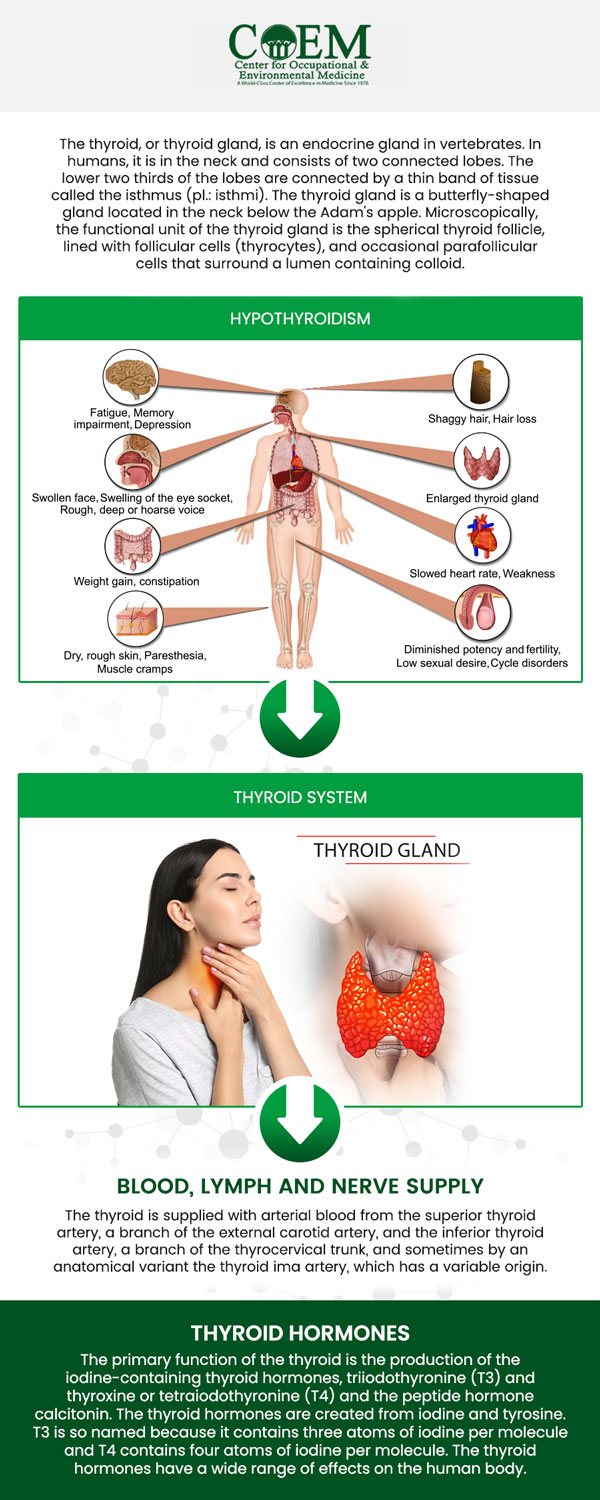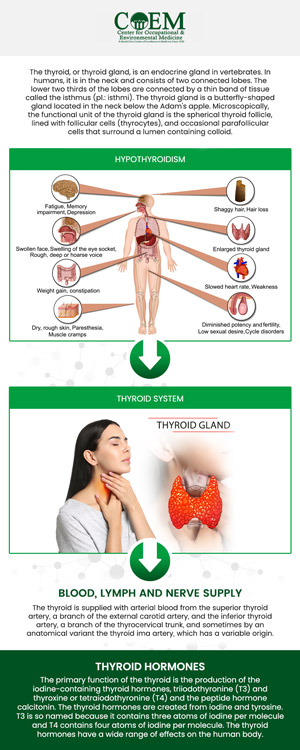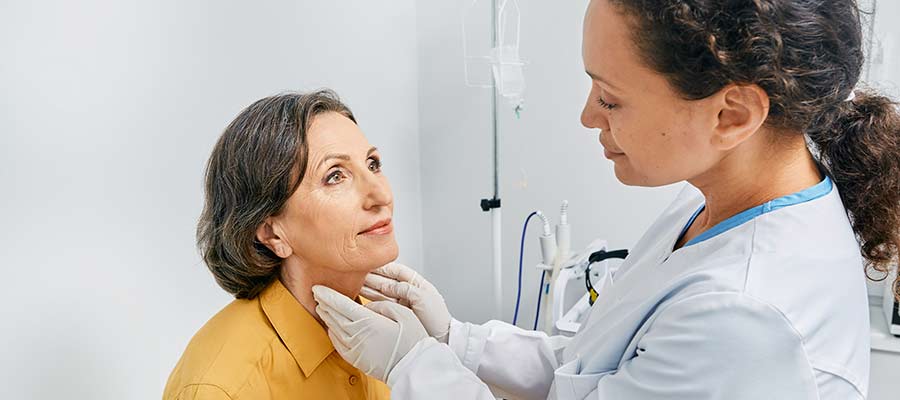Thyroid Treatment Clinic in Charleston, SC
The thyroid is a butterfly-shaped gland located in the neck that regulates metabolism, energy production, and growth. It produces hormones such as thyroxine (T4) and triiodothyronine (T3) that influence various body functions. Imbalances in thyroid hormone levels can lead to conditions like hypothyroidism or hyperthyroidism. At The Center for Occupational and Environmental Medicine (COEM), our team provides comprehensive care to address thyroid-related concerns. For more information, contact us today or schedule an appointment online. We are conveniently located at 7510 North Forest Drive North Charleston, SC 29420. Patients routinely fly in to be evaluated by COEM, as we serve patients internationally. Find out if you have been exposed, extensive lab testing is available.




Table of Contents:
What is thyroid disease, and what causes it?
What are the symptoms that indicate I may need thyroid treatment?
How often do I need to check my thyroid levels while on treatment?
How is thyroid disease treated?
Thyroid disease refers to various conditions that disrupt the normal function of the thyroid gland, whether through underproduction or overproduction of hormones. The thyroid plays a role in regulating metabolism, body temperature, and energy levels. When the gland becomes overactive, as seen in hyperthyroidism, or underactive, as in hypothyroidism, a wide range of health problems can arise. Causes may include autoimmune disorders such as Hashimoto’s thyroiditis or Graves’ disease, chronic inflammation, iodine deficiency, certain medications, or even previous radiation exposure. Sometimes it can also be linked to genetic predisposition or long-term exposure to environmental toxins that affect endocrine function. Understanding the root cause of thyroid dysfunction is essential when mapping out a plan for treatment. The specialists at the Center for Occupational and Environmental Medicine (COEM) take into account various factors, including the patient’s broader medical history, environmental exposures, and any signs of immune system dysregulation that may be contributing. Thyroid disease is not always straightforward, especially in cases where the gland’s hormone production appears borderline or inconsistent, which makes accurate diagnosis and individualized treatment necessary.
Symptoms associated with thyroid dysfunction can fluctuate, given the highly varied nature of the condition. Individuals with low thyroid hormone levels may experience persistent fatigue, unexplained weight gain, sensitivity to cold, constipation, or depression. Others might report dry skin, brittle nails, thinning hair, or a general sense of sluggishness. In cases of hyperthyroidism, where the thyroid is overactive, patients might feel anxious or restless, lose weight without trying, or experience heart palpitations and increased sweating. These symptoms tend to build gradually, making them easy to overlook at first. Patients who notice these symptoms persisting over time are typically advised to undergo thyroid hormone testing. When left untreated, thyroid disorders can affect cardiovascular health, fertility, and overall quality of life. Functional medicine providers consider a full panel of thyroid markers alongside broader hormonal and metabolic indicators. The evaluation process may involve checking TSH levels. It may also include looking at free T3, free T4, and thyroid antibodies often gives a more complete picture. From there, the goal is to match treatment to the patient’s physiological needs in addition to their reference ranges.
Once thyroid treatment begins, regular monitoring becomes an essential part of the care process. In most cases, follow-up blood work is recommended every six months to assess whether hormone levels remain in a healthy range. These lab checks help determine if the dosage of thyroid medication remains appropriate or if adjustments are required based on how the patient is responding. Symptoms, energy levels, and physical exam findings are also factored into any changes that may be made.
Depending on the type of thyroid condition and the treatment plan, more frequent testing may be necessary early on or if new symptoms appear. Some individuals, particularly those transitioning between medications or dealing with complicating factors like autoimmune disease, may need closer monitoring. Thyroid function is dynamic and can shift in response to stress, illness, diet, or other changes, which is why ongoing evaluation remains important even after symptoms stabilize.
Treatment for thyroid disease depends on whether the gland is underactive, overactive, or affected by an autoimmune condition. In cases of hypothyroidism, the most common approach involves Hormone Replacement Therapy (HRT). This can take the form of synthetic T4, such as Levothyroxine, or natural desiccated thyroid options like Armour Thyroid or Nature-Throid, which contain both T3 and T4. Some patients respond better to formulations that include both hormones, especially if their body has difficulty converting T4 to T3 due to low enzyme activity. Deciding between synthetic and natural hormone replacement often comes down to how the patient feels, along with how lab values trend over time.
Health and lifestyle changes are often incorporated to support thyroid function, including stress management, nutritional support, and regular physical activity. The specialists at COEM may explore whether environmental triggers are interfering with the thyroid’s ability to function properly, and they consider both clinical signs and lab results when deciding how best to proceed. Heat-based therapies, dietary changes, and supplemental protocols may all be part of a larger plan aimed at stabilizing hormone levels and improving overall well-being.
Thyroid treatment is available at the Center for Occupational and Environmental Medicine (COEM). For more information, contact us today or schedule an appointment online. We are conveniently located at 7510 North Forest Drive North Charleston, SC 29420. We serve patients from Charleston SC, Mount Pleasant SC, Summerville SC, North Charleston SC, Goose Creek SC, Ladson SC, Hanahan SC, James Island SC, John’s Island SC, Daniel Island SC, West Ashley SC, Moncks Corner SC, Sullivans Island SC, Folly Beach SC, Isle of Palms SC and all of South Carolina, Nationally, and Internationally. Patients routinely fly into Charleston to be evaluated by COEM and to enjoy this beautiful city, which is a Condé Nast and Travel and Leisure Top Domestic and International Tourist Destination.

Check Out Our 5 Star Reviews


Additional Services You May Like
- Functional Medicine
- Allergy and Autoimmunity
- Asthma and COPD
- Autoimmune Diseases
- Allergy and Immunology
- Anti Aging Medicine
- Autism and Children
- ADHD
- Bacterial Infections
- Chemical Toxicity
- Candida Fungal Problems
- Cancer Treatment
- Chronic Illness
- Chronic Inflammatory Response Syndrome (CIRS)
- Chronic Fatigue
- Cardiovascular Disease
- Carbon Monoxide Poisoning
- Chelation Therapy
- Depression
- Environmental Medicine
- Ear Ringing and Dizziness
- Fatigue Treatment
- Fertility and Preconception Care
- Gut Health
- Heavy Metal Toxicity
- Hormonal Imbalances
- Headaches and Migraines
- Hormone Balancing (Men & Women)
- Hepatitis
- Integrative Medicine
- Independent Medical Evaluations
- Influenza
- Lab Testing
- Mold Toxicity
- Malnutrition
- Neurodegenerative Disease
- Natural Hormone Balancing For Women
- Preservative-Free IV Therapy
- Stomach Acid Imbalance
- Smoking Cessation Program
- Skin Therapy (Anti-Aging)
- Swine Flu
- Thyroid
- Mold Toxicity
- Vitamin D
- Weight Loss Program
- Women’s Breast Health Formula

Additional Services You May Like
- Functional Medicine
- Allergy and Autoimmunity
- Asthma and COPD
- Autoimmune Diseases
- Allergy and Immunology
- Anti Aging Medicine
- Autism and Children
- ADHD
- Bacterial Infections
- Chemical Toxicity
- Candida Fungal Problems
- Cancer Treatment
- Chronic Illness
- Chronic Fatigue
- Cardiovascular Disease
- Chronic Inflammatory Response Syndrome (CIRS)
- Carbon Monoxide Poisoning
- Chelation Therapy
- Depression
- Environmental Medicine
- Ear Ringing and Dizziness
- Fatigue Treatment
- Fertility and Preconception Care
- Gut Health
- Heavy Metal Toxicity
- Hormonal Imbalances
- Headaches and Migraines
- Hormone Balancing (Men & Women)
- Hepatitis
- Integrative Medicine
- Independent Medical Evaluations
- Influenza
- Lab Testing
- Mold Toxicity
- Malnutrition
- Neurodegenerative Disease
- Natural Hormone Balancing For Women
- Preservative-Free IV Therapy
- Stomach Acid Imbalance
- Smoking Cessation Program
- Skin Therapy (Anti-Aging)
- Swine Flu
- Thyroid
- Mold Toxicity
- Vitamin D
- Weight Loss Program
- Women’s Breast Health Formula










